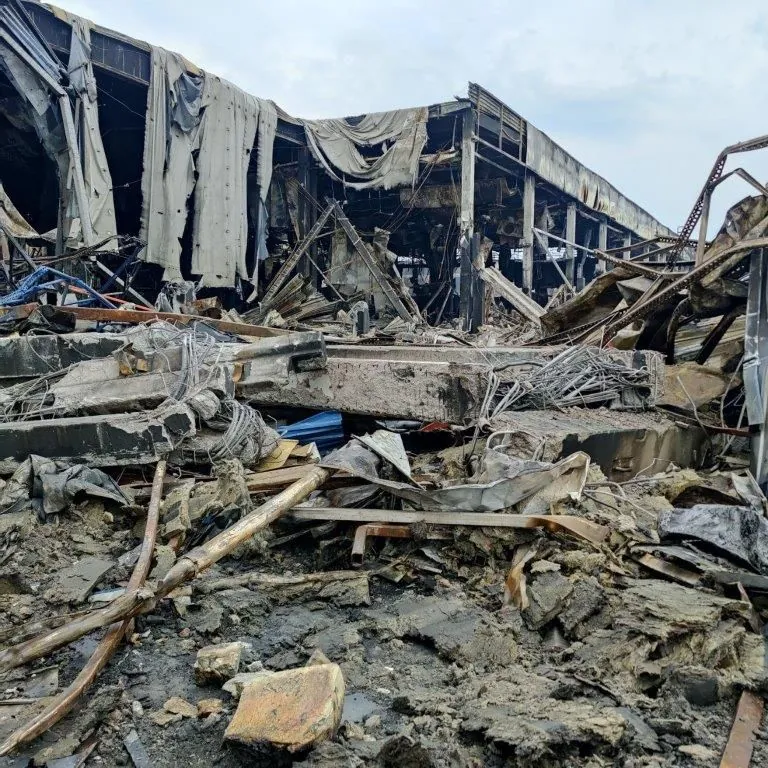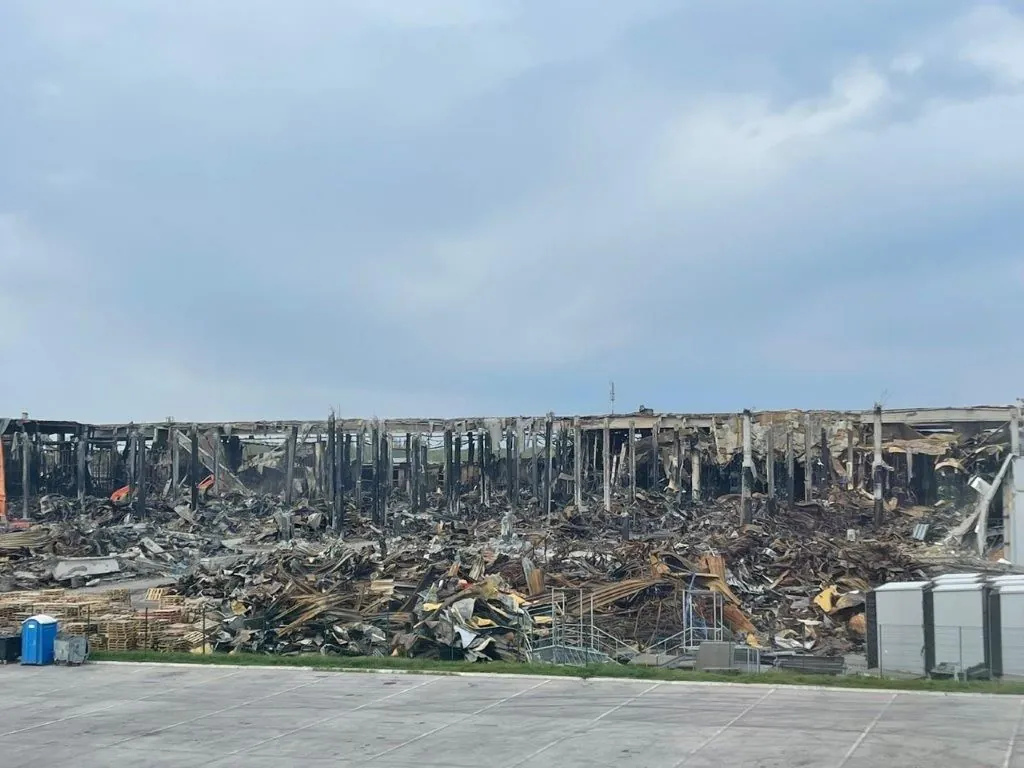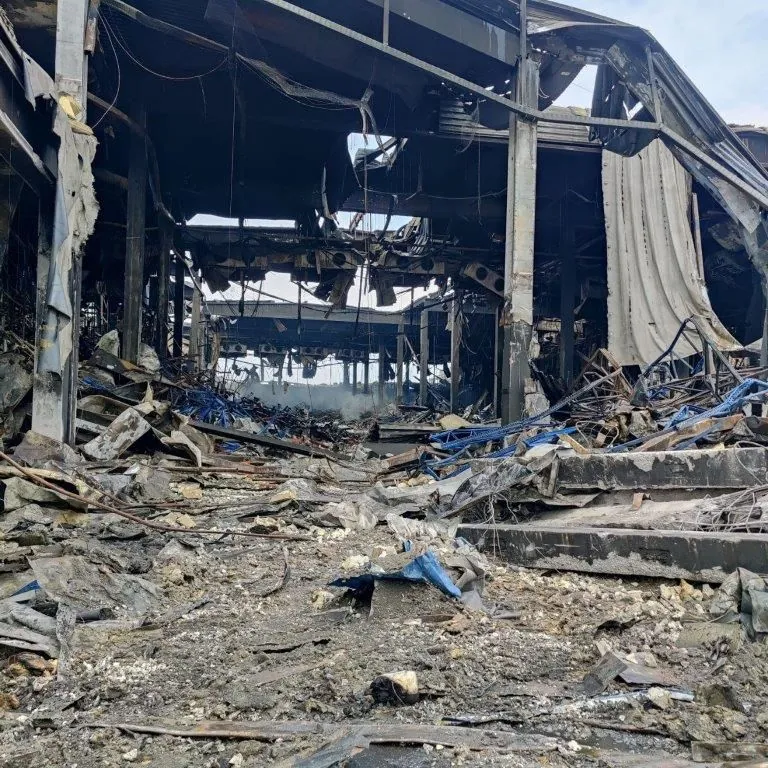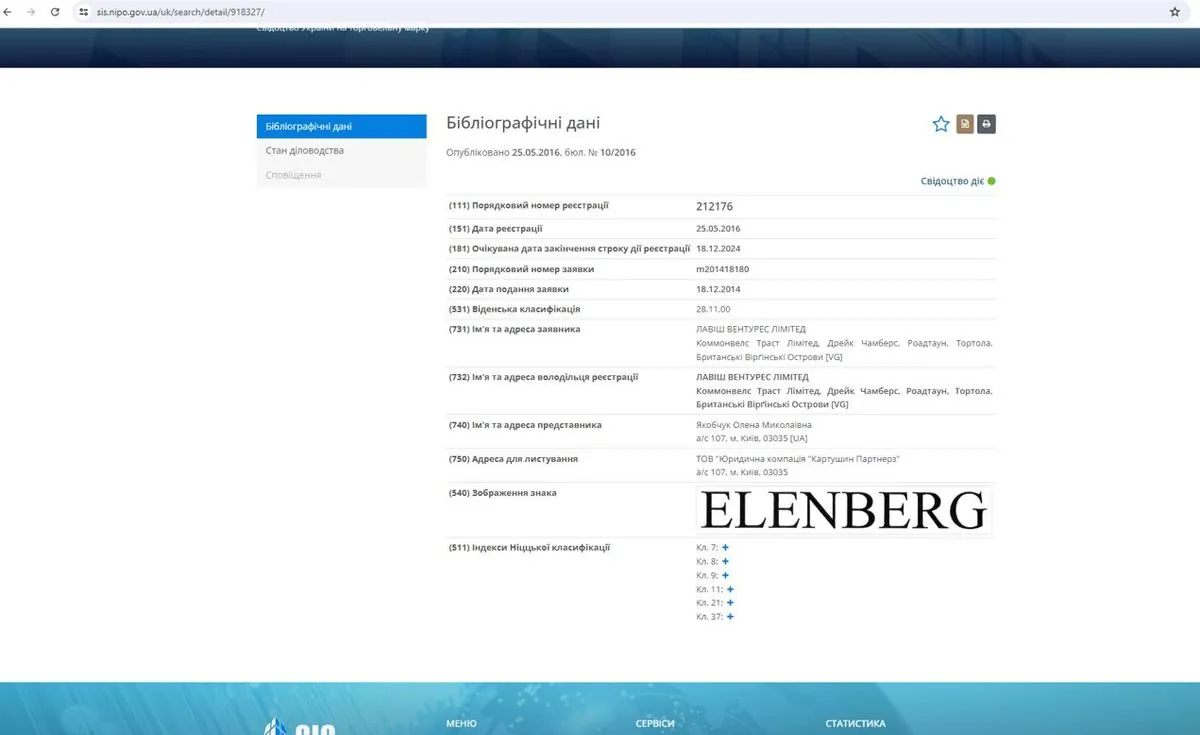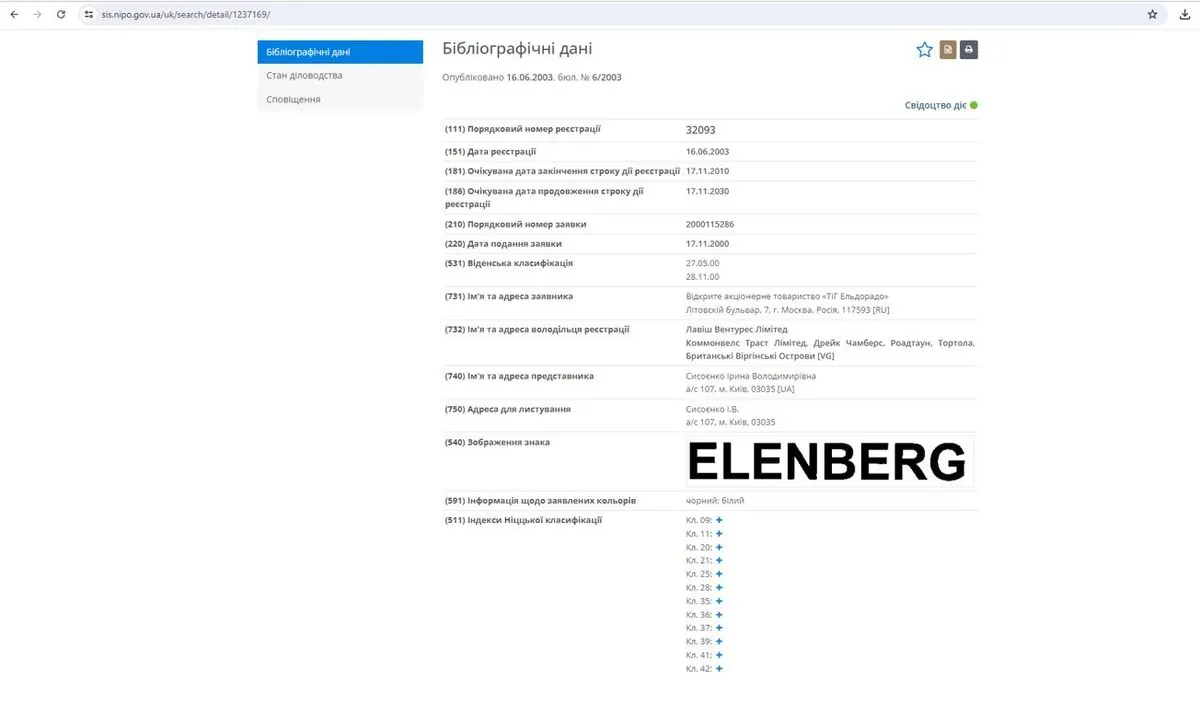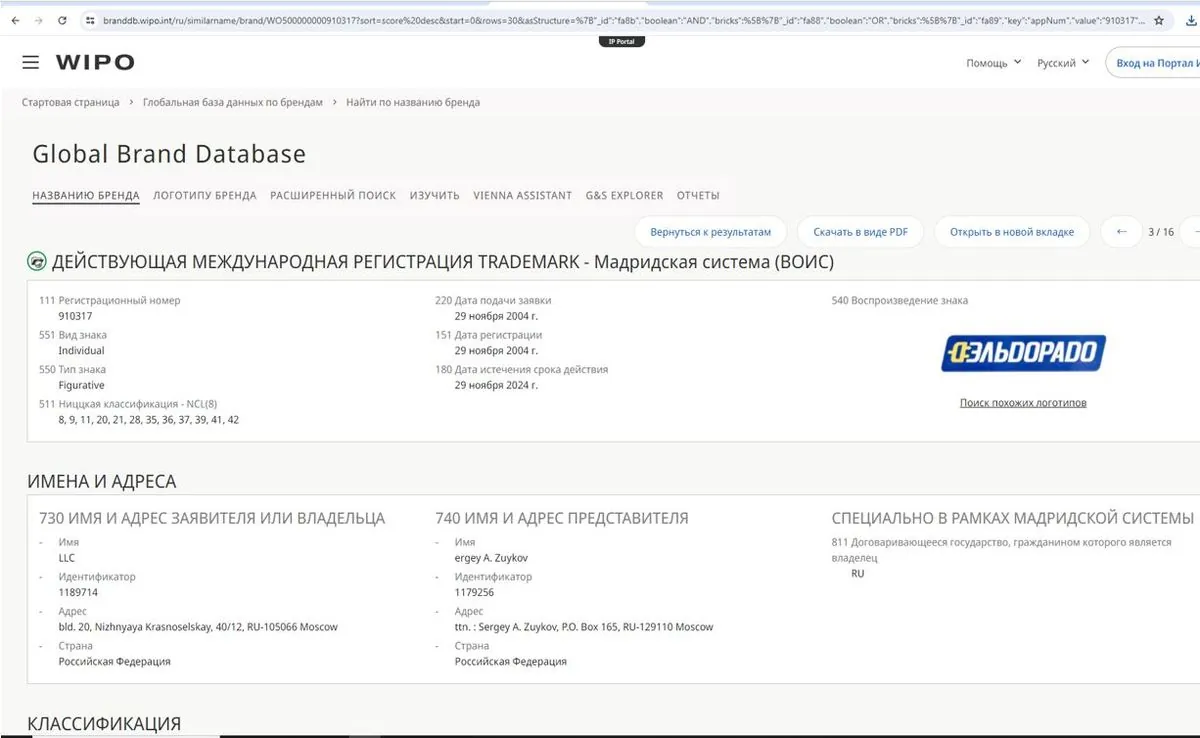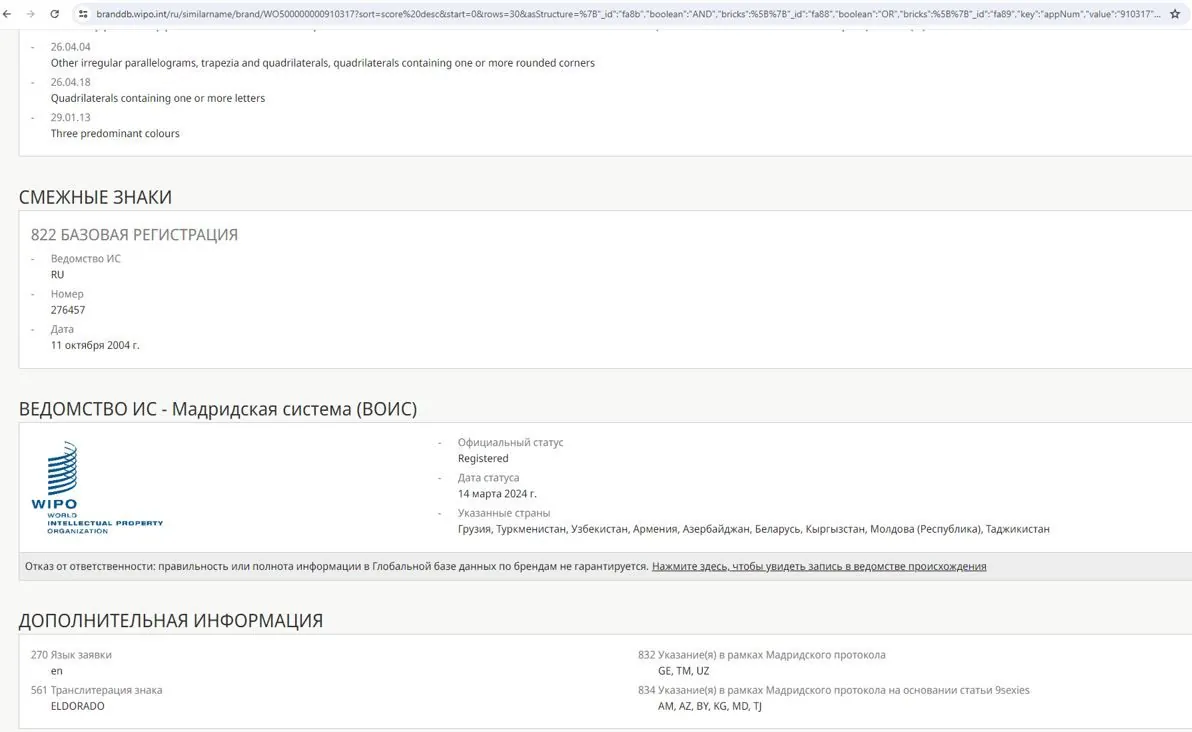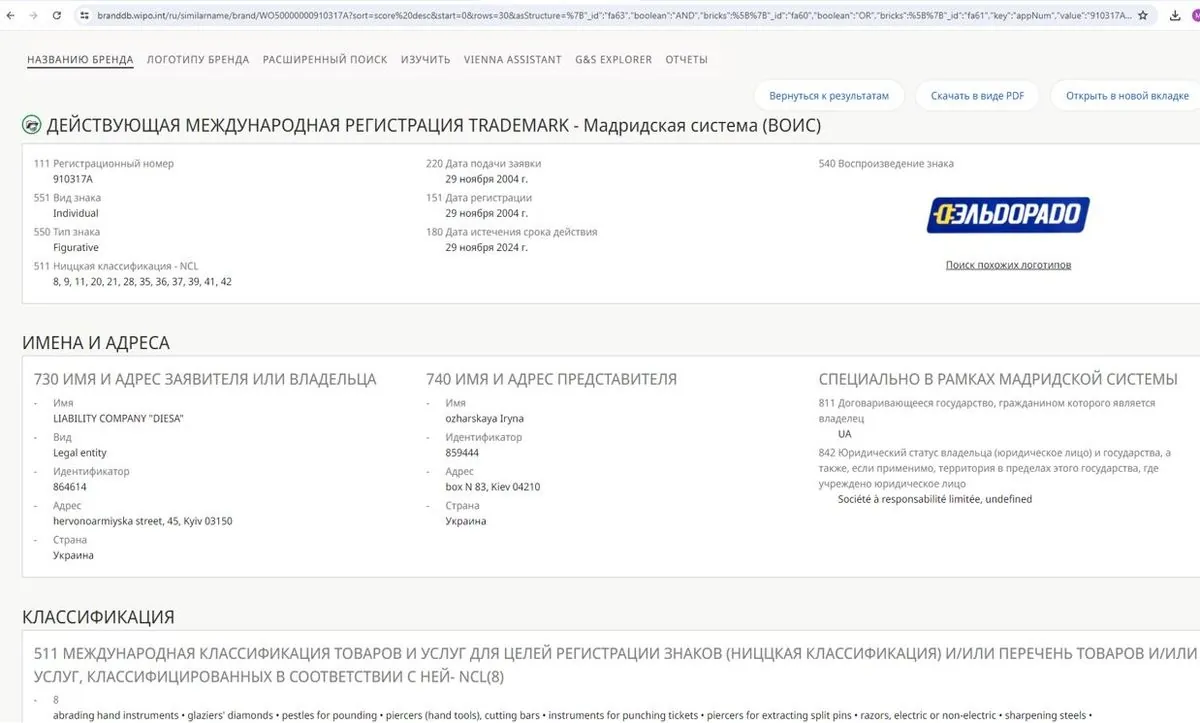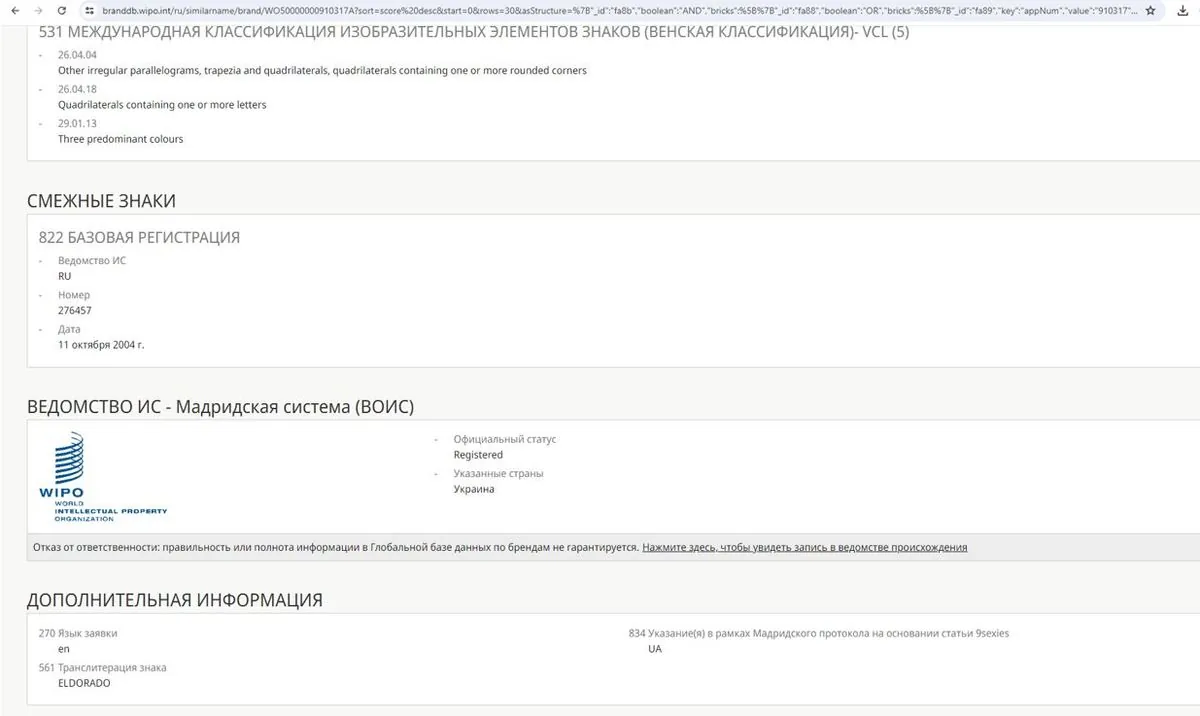Some suppliers have worsened their terms of cooperation despite the war: Eldorado CEO on how the home appliance market reacted to the full-scale war
Kyiv • UNN
After the full-scale invasion began, some foreign suppliers of electronics and home appliances actually worsened their terms of cooperation with Eldorado and refused to restructure their debts. This complicated the company's already difficult financial situation and forced it to take the necessary step of reorganization.

Destroyed stores, warehouses, danger to employees, a drop in the population's ability to pay, changes in the terms of cooperation from foreign suppliers - these are just some of the problems faced by retailers since the beginning of Russia's full-scale invasion of Ukraine.
The electronics and home appliances trade has always been extremely dependent on imports. At the beginning of the full-scale invasion, most foreign suppliers suspended their work with Ukrainian companies. And when they began to return to the Ukrainian market, they completely changed the terms of cooperation, demanding full prepayment for goods and repayment of debts for goods already delivered. This further complicated the already difficult financial situation of retailers.
Eldorado , a chain of electronics and home appliances supermarkets, has taken a forced step to reorganize in order to save its business, pay its suppliers and save jobs.
Vira Vitinska, CEO of Eldorado, told how the large-scale intrusion changed the network's work, what the rehabilitation procedure is and what it will bring in an interview with UNN .
- How did the start of the full-scale invasion affect the Eldorado network
A week before the full-scale invasion began, there was tension in the team because our foreign suppliers started talking about the war. Some international companies issued an internal order for their foreign representatives to leave Ukraine immediately. But everyone around us was saying that there might be some kind of escalation in Donbas, but definitely not a large-scale invasion.
On Monday, February 21, our competitors started collecting goods in their stores in Mariupol. Having seen this, we decided to order a truck on Tuesday and start collecting expensive goods for export. However, while we were collecting, the full-scale war started. At most, we managed to get one car out of there, while the rest was still collected in the stores and later lost.
The last working day of our stores in the east was February 23, and from February 24 to March 1, 2022, all stores in the country were closed.
But the work did not stop. We set up an internal task force - a coordination headquarters - to help and coordinate requests from company employees, volunteers, NGOs, the Armed Forces across the country, especially from Mariupol, Dnipro region, Zaporizhzhia, Kherson, Kyiv, and Kharkiv. A lot of employees moved across the country, we provided assistance and employed them in other stores of our chain, where the security situation allowed As of February 2022, we employed more than 3,500 people and we never laid off employees during the rehabilitation period. Only those who wanted to leave, as well as those who went abroad, were dismissed. We tried to support our people. We have more than 150 mobilized employees, whom we helped as much as we could. Both the team and the company. As of July 19, 2022, the law abolished the payment of salaries to mobilized employees at their place of work, but we paid compensation in the amount of the average monthly salary until July 2023.
We also tried to preserve the goods and other assets of the company as much as possible. After the full-scale operation started, we rented some retail space and warehouse space in Ternopil, Ivano-Frankivsk and Lviv for warehouses and started transporting goods there. It was very difficult in Kharkiv and the region, as there were very active hostilities there. We also had stores in Sloviansk, Kramatorsk, Kostiantynivka, Pavlohrad. No carrier wanted to go there. Everyone was working to preserve the assets as much as possible. Unfortunately, some of the equipment was damaged during the move because it is difficult to load and transport goods under fire.
- When was the decision to open stores made and what prompted it
On March 1, stores gradually began to open where the security situation more or less allowed. First, in the center and west of Ukraine. Every day we updated the information about the open stores. We decided to launch sales primarily because of the need of our customers and volunteers. Many people were forced to move because of the fighting, and some things were lost. The most popular products at the time were laptops, phones and power banks. The opening of the stores also made it possible to provide assistance at the request of volunteers and the Armed Forces, and to actively cooperate at that time with the Come Back Alive Foundation and the Eastern Europe Foundation, which were purchasing equipment for the needs of the Armed Forces.
- How many stores have had to close due to the widespread invasion?
As of February 2022, we had about 130 stores. During the full-scale war, we lost 21 stores. The main loss of stores was in Mariupol, Berdiansk, Nova Kakhovka, Melitopol and Kherson.
Our central warehouse was also destroyed by a rocket in 2022. We were just preparing for the March 8 season and always rented warehouses before this holiday, because sales are high during this period. Therefore, when a rocket hit the warehouse, the losses were enormous. The damage caused by the hit to the central warehouse exceeded $15.9 million. And we still owe money to our suppliers for the goods that were destroyed in the warehouse and in the stores.
- Are you still paying for goods that were destroyed in 2022? Why did this situation happen?
Let me explain in simple terms. The way the home appliance market generally works is that we take goods for sale or on a deferred payment plan, put them on the shelf and sell them. On average, we had 75 days from the date of delivery to pay the supplier. The deferred payment terms are different for each supplier, but 100% of the terms are practically post-payment for the goods. That is, all the goods that we had in our warehouses or stores were on a deferred payment plan, and we owed most of the money to suppliers.
- How did foreign suppliers react to the beginning of the full-scale invasion? Did they make concessions to you, taking into account the losses the company suffered?
Suppliers stopped working completely almost immediately - some of them sent letters saying that due to force majeure they were not working and would not ship goods.
At the same time, we had some supplier partners who called on February 24 and demanded payment for the equipment they had delivered. Some even offered a 10% discount just to get us to pay as quickly as possible.
After vendors began to resume operations in Ukraine, they demanded full prepayment for the supply of new goods and at least 20% more payment on the old debt.
As a result of the hostilities, the company suffered significant financial losses due to the loss of stores, equipment, and goods, and suppliers began to demand payment, and we could not cope with this. In order to pay in full, we needed to sell something. There was partially nothing to sell, as the equipment was destroyed, so we could not pay the suppliers.
In 2022-2023, we spent almost all of our funds to repay our debts to suppliers as long as we had the opportunity and resources.
In addition, we were constantly negotiating, writing letters, meeting with representatives of vendors and suppliers, explaining the situation and offering to meet with them to provide discounts and installments in connection with the large losses incurred. Someone made concessions, someone categorically objected. We applied to various banks to get additional financing, but it didn't work out. As of September 2022, we needed only UAH 200 million of additional financing to keep sales and supplies at the level of market demand and gradually repay debts to suppliers from profits, as assets were partially lost.
Editor's note. UNN sent an information request to Oschadbank to find out whether the Eldorado network had actually applied for loans from the bank after the full-scale invasion began. As of the date of this interview, no response has been received.
All this time, we continued to operate as much as possible. As of September 2022, we had about 80-85 stores out of 130. Some of the stores were occupied, some were lost, some were damaged or closed due to the security situation
- When was the decision to use the pre-trial rehabilitation procedure made and why did you have to use this tool?
What led to the reorganization - debts to suppliers. Each supplier demanded to pay the old debts. We had no money to pay them because of the losses caused by the hostilities, so we paid off everything we could in 2022 and early 2023
Some of them made concessions and gave us installments, others tried to write off some of our debts, for which we are very grateful. One of our regular partners, with whom we have been working for more than ten years and whose goods we had for sale, refused to return unsold goods and decided to blackmail us with a bankruptcy filing. This is a kind of lawsuit for legal blackmail. Proceedings may not be initiated on this particular claim, but a lot of noise can be made. It is clear that this immediately had a negative impact on the company's operations. It caused concern even among those suppliers who were "in the position" of the company, taking into account the losses it had incurred, and continued to ship goods. After all, the bankruptcy procedure actually implies the cessation of operations and the need for all creditors to file claims. Even if certain creditors could have postponed the fulfillment of their obligations, they are forced to make such claims, as they will lose their right to receive funds. Thus, if a court considers a bankruptcy petition filed by one of our suppliers, it will result in the need for all counterparties to file claims for debt collection. Although the vast majority of them did not intend to do so due to their understanding of the situation and their desire to maintain the partnership and support our company as a stable and conscientious partner.
When the number of claims and lawsuits increased, and a particular small creditor directly blackmailed us with another bankruptcy filing (because the first one was effective in his opinion), we were forced to do something about it in a comprehensive manner. We want to continue working, selling and doing our business. Therefore, we realized that in this situation there would be nothing better than a reorganization procedure. This decision was made in early August 2023.
Not all supplier-creditors liked it, and a small group of creditors are still trying by all means to prevent pre-trial rehabilitation and liquidate the network through bankruptcy. Although we have explained this, and experts' calculations prove that liquidation of the company will not give them anything better than the rehabilitation procedure. In bankruptcy, the claims of fourth priority creditors will be satisfied by 5.64%, while in the pre-trial rehabilitation procedure, unsecured creditors will receive almost 24.36% more direct repayment of existing debt and will additionally receive a partial repayment of the principal debt after the company has been reimbursed for the losses incurred as a result of the full-scale military aggression of the Russian Federation against Ukraine.
On the contrary, suppliers who supported the idea of reorganization are not satisfied with the actions of the so-called "strikers" because they could have been receiving their money for almost a year.
Sanitation is a very responsible step. Moreover, it is a five-year rehabilitation. Any failure to fulfill financial obligations to creditors may be grounds for canceling the rehabilitation and returning to bankruptcy proceedings.
By the way, the owners of some of the vendors who are actively opposing the out-of-court sanation are quite successful in selling their products in Russia, keeping staff there and paying taxes. What is also interesting is that some of our supplier partners indicated in their audit that they had written off millions of dollars due to the hostilities in Ukraine, but they still continue to sue us and recover the losses written off on their balance sheets. Please note that a long-term partner with European approaches to business and values is writing off millions of dollars in losses due to the hostilities in Ukraine, and its management is initiating the destruction of its sales network through bankruptcy proceedings.
We tried our best to pay off all our debts, we did not sit idly by. Not all of the debts went into reorganization, we partially paid them to creditors. For example, the debt to one of our suppliers was about UAH 200 million at the start of the full-scale reorganization. At the time of the reorganization, the debt was only UAH 40 million.
The debt to some suppliers that we submitted for reorganization is only 25% of the original amount, which is essentially the margin they earn from us (the rest has been paid). For large corporations, this is not a big loss, but for some reason, some suppliers did not want to make concessions and help as much as possible.
The main goal of the pre-trial rehabilitation was to save the business, offer creditors a way out of the situation, and preserve jobs and customer confidence, as the work with customers does not end with the sale, there is also service, return, and replacement of goods.
- The Kyiv Commercial Court recently ordered Eldorado to recover UAH 141.4 million in damages from Russia for the full-scale invasion. How did you decide to take this step and how did you win the case?"
We collected a large set of documents that confirmed the presence of goods in the stores or in the warehouse at the time of the occupation or during the "arrivals". We also received documents from the landlords confirming that the stores were completely destroyed and the goods were destroyed.
And then we went to court with all these documents. The biggest difficulty was that we had movable property. That is, if there was a house, and now it's gone, that's one thing. But it was much more difficult to prove that this phone or its case was in this particular store when it "arrived".
To determine and confirm the losses incurred by the company, experts were engaged to assess the damages, and in addition to the assessment, an expert examination was also conducted. The examination was carried out by a forensic expert for about 6-7 months, as all the primary documentation, movement, and sale of goods were checked and the balance of goods on the relevant day was established. This is a very impressive array of documents and very painstaking work.
Based on all of this, the court found that we had indeed suffered losses and ordered us to recover them from Russia.
- Let's be honest. The media has repeatedly talked about the Eldorado chain's ties to Russia. But it seems illogical that a Russian network is filing a lawsuit against Russia.
Yes, in fact, there is such a problem with media coverage, but the Ukrainian company has nothing to do with the Russian one.
"Eldorado until 2009 consisted of actually three entities in different countries - Ukraine, Kazakhstan and Russia. In 2009, after big problems from the Russian security forces, the owner Igor Yakovlev sold Eldorado itself for 625 million to the PPF financial group, Czech Republic (publicly available information at the time).
In 2013, the Eldorado chain in Ukraine was sold. In fact, it was a merger of two chains - Technopolis and Eldorado. After the merger, there were no longer any Russians or persons associated with them among the owners of Eldorado.
Thus, Eldorado became a separate entity in Ukraine and has since had nothing to do with Russia. Along with the stores located in Ukraine, some trademarks were sold to the new owners with distribution exclusively in Ukraine. In addition to Eldorado, these include Elenberg and HITECHNIC. But I should emphasize that these names were also sold in the summer of 2013. We had no common marketing policy, no suppliers or office.
- Why did the company's name remain Eldorado if all ties with Russia were severed?
First, it was more profitable in terms of marketing, because the Eldorado name was more recognizable among customers. Second, Eldorado had more stores. In addition, in July-August 2013, there was no talk of a war with Russia.
After the Revolution of Dignity, in 2014-2015, Eldorado was already a large chain in Ukraine and it was very risky to change the TM and positioning, as it would have led to the loss of customers and large rebranding costs. Moreover, even if the chain had been renamed in 2014-2015, there would still be an association with the previous TM. We tried to separate ourselves from the association with the Russian chain by rebranding as much as possible - the chain became Eldorado, but the positioning changed, the very look of the TM and management approaches changed, etc.
- You are also accused of continuing to sell Russian-made equipment - Redmond, Vitek, Vinzer, Bork - after the war started in 2014. How can you comment on this?
Let's start with the fact that before the full-scale invasion, there was no ban on the presence of such goods in Ukraine. Such products were present on the shelves in all chains, not only in Eldorado.
But what is the retail market for household appliances in Ukraine? There is virtually no product uniqueness. Everything on the shelves of competing stores is almost identical. No one is practically engaged in their own brands or any unique products for the customer.
We sold all the brews we supplied to Ukraine through intermediaries or representative offices, and this was not prohibited.
As a rule, retail chains do not engage in imports, only importing their own brands and some European ones. Imports are carried out by entities that are official representatives of foreign suppliers.
If we take the Redmond brand, they had a corporate conflict in the company before 2022. This TM was owned by a Russian and a Ukrainian, but the Ukrainian owner died and his wife hired lawyers and separated the Ukrainian part from the Russian one. The Ukrainian company under the Redmond brand began to import goods directly from Chinese factories. That is, by the time the full-scale war began, Redmond was no longer Russian.
We never sold Bork at all, and Vinzer and Vitek left the Ukrainian market after 2014.
We did not import any equipment from these brands on our own, and, accordingly, did not pay money to Russia.
If we talk about the Ellenberg trademark, then, as I have already said, this is a TM, the rights to which were sold back in 2013. This can be seen in international registers, as well as the international TM Eldorado.
To say that Ellenberg in Ukraine and Ellenberg in Russia are controlled by the same owner is legally incorrect and factually untrue.
Why was it crucial to keep this brand? Because as of 2014-2015, this brand was No. 1 in sales in Ukraine in the category of freezers and refrigerators. That is, it is a brand with certain purchase contracts. We had direct contracts with factories in China, where we had equipment manufactured to our specifications and design under the Ellenberg brand.
We completely customized a certain model of refrigerators, freezers, washing machines, kettles, etc.
Russia has registered its own TM Ellenberg and sells goods under this brand there. But they have nothing to do with the goods sold in Ukraine. If a Russian Ellenberg enters Ukraine, we can sue them and recover all the remuneration.
These are completely different brands. For example, refrigerators may be called Ellenberg, but they will be completely different in terms of technical characteristics. We developed the specifications ourselves together with representatives of factories in China.
We do not have any foreign currency outflows, except for the payment of our Chinese contracts. But these are direct contracts that relate only to Chinese factories, which we pay directly.
Everything else is paid on the territory of Ukraine, under contracts and agreements related to Ukrainian transactions.
Editor's note. UNN asked the customs service for information on whether the Eldorado chain does not import equipment under the Ellenberg brand from Russia. As of the day of the interview, no response has been received.
- There was also a scandal in the media because your chain's stores were selling fan heaters with the label "number 1 in Russia" on the box after the full-scale invasion had already begun. How can you comment on this?
These were leftover goods that had been delivered to us long before February 2022 by a Ukrainian supplier. They really didn't realize that this product was on a shelf with double markings. After the coverage, we punished the perpetrators, collected the remnants of those fans and handed them over to volunteers.
- You said that you have rebranded. Was it a step to separate yourself associatively from the Russian brand?
We made the first rebranding in the fall of 2016. The look of the brand has completely changed. We removed the icon that looked like a rashka. We also changed the design in stores and processes within the chain.
This change was motivated by the need to move away from the associative series of logos of the Ukrainian and Russian Eldorado. Also, during this rebranding, we wanted to move away from the position of a discount store with cheap goods, because the customer's shopping goals have changed. Customers began to buy more products from the middle price segment. Our first renovated store opened in 2016 in Lavina Mall.
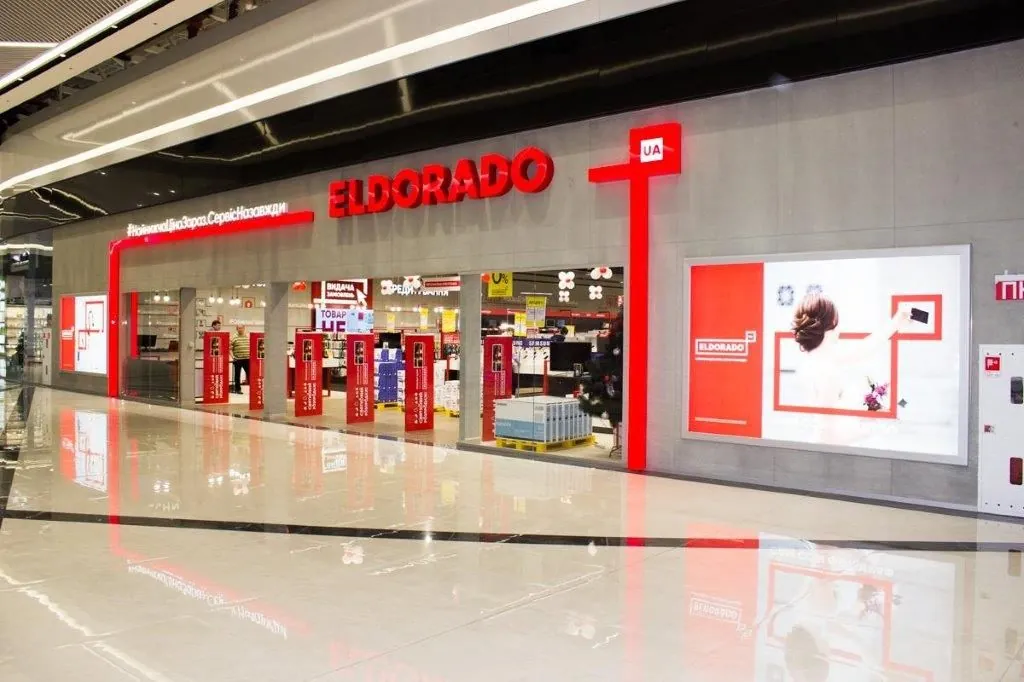
The second rebranding, during which we changed our positioning, took place in 2021. We became "Eldorado for families". This is not just a slogan. It was a whole campaign - from our employees' work with the client to changing the logo and color scheme. We started to change internally, to change the service.
The motivation for this rebranding was that we decided to change. First, we changed our internal corporate policy - the rules of conduct with clients, service rules, etc.
This helped us achieve good results in the market, and in January 2022, Eldorado's market share was a record high. This was all thanks to our internal rebranding. If not for the outbreak of a full-scale war, we would have a much higher market share today.
For some suppliers who sued us in 2023, we became No. 1 in the sales structure.
At the beginning of 2022, the management proposed to change the brand because everyone in the market was changing. But I believe that this will do nothing - people will still associate stores with the same brand. That is why we started working to distance ourselves from this association as much as possible. This decision was made because it was more cost-effective, as changing the TM entails a lot of expenses, which we did not have the resources for.
